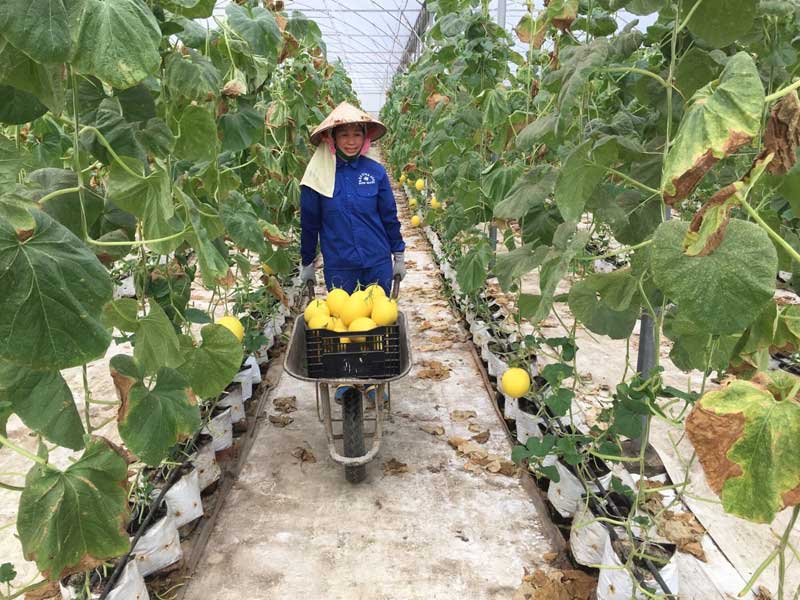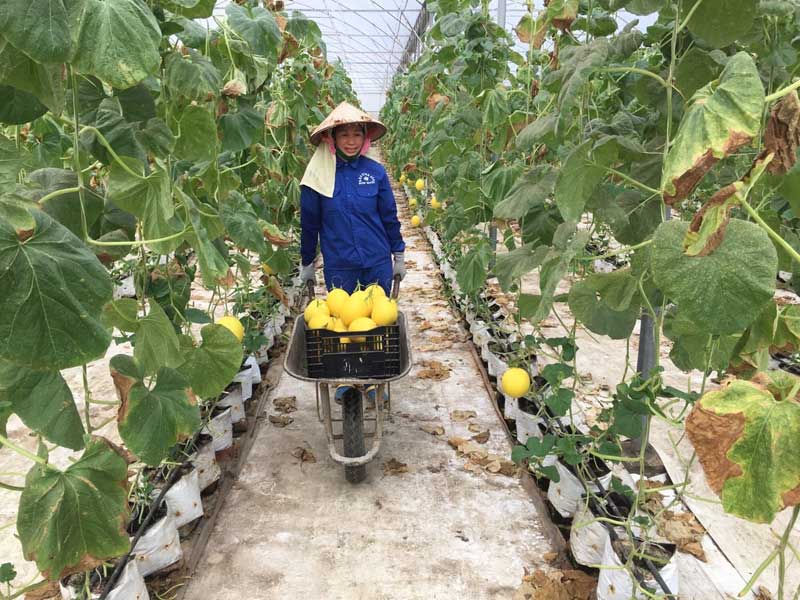
(HBO) - Cooperation and linkage in production in association with farm produce sales plays an important role in agricultural production, helping expand production scale, promote technology application, improve management capacity, and increase the interests of participants, especially farmers.

Melons grown under VietGAP
process in greenhouse of Hoa Binh GAP one-member limited company in Ba Hang Doi
township (Lac Thuy).
To boost agricultural
production linkages in value chains, the Hoa Binh provincial People’s Committee
issued Decision No.1340 dated June 5, 2018 approving a project to build and
develop food-safety value chains of key agricultural products in the 2018-2020
period, with a vision to 2025 in Hoa Binh province.
To date, agricultural
production in association with marketing and origin tracing has received more
and more attention. The province currently has 51 supply chains of safe food
and farm produce such as tea, orange, grapefruit, pork, chicken meat, goat
meat, honey and fish.
Stepping up linkages
in agricultural production has contributed to increasing the awareness, role
and responsibility of producers, ensuring market demand-supply, and protecting
consumers’ health.
However, there remain
several shortcomings, including small production scale, asynchronous
infrastructure, dependence on weather, instable market prices and cooperatives’
weak management capacity.
In the time to come,
localities are advised to pay attention to developing the processing industry,
concentrated material growing areas and marketing; and create an open mechanism
to encourage competent enterprises to apply high technology in production
towards cooperation and connectivity in value chains.
It is necessary to
develop farm economy, promote the development of collective economy, diversify
forms of production and distribution linkages, develop electronic origin
tracing systems, support production and business facilities in origin tracing,
and test quality before putting products to the market so as to sustainably
developing production and distribution chains./.
According to data from the Hoa Binh Provincial Party Committee, the industrial production index for the first six months of 2025 is estimated to have increased by 20% compared to the same period last year. This marks the highest year-on-year growth rate for this period since 2020.
In the first six months of 2025, Hoa Binh province’s export turnover was estimated at 1.145 billion USD, marking an 18.11% increase compared to the same period in 2024. Import turnover was estimated at $ 804 million, a 17.15% increase, which helped the province maintain a positive trade balance.
The lives of the ethnic minority farmers in Tan Lac district have gradually improved thanks to the new directions in agricultural production. This is a testament to the collective strength fostered through the professional associations and groups implemented by various levels of the district’s Farmers’ Union.
With the motto the "product quality comes first,” after nearly one year of establishment and operation, Muong village’s Clean Food Agricultural and Commercial Cooperative, located in Cau Hamlet, Hung Son Commune (Kim Boi district), has launched reputable, high-quality agricultural products to the market that are well-received by consumers. The products such as Muong village’s pork sausage, salt-cured chicken, and salt-cured pork hocks have gradually carved out a place in the market and they are on the path to obtaining the OCOP certification.
In the past, the phrase "bumper harvest, rock-bottom prices" was a familiar refrain for Vietnamese farmers engaged in fragmented, small-scale agriculture. But today, a new spirit is emerging across rural areas of Hoa Binh province - one of collaboration, organisation, and collective economic models that provide a stable foundation for production.
Maintaining growing area codes and packing facility codes in accordance with regulations is a mandatory requirement for agricultural products to be eligible for export. Recently, the Department of Agriculture and Environment of Hoa Binh province has intensified technical supervision of designated farming areas and packing facilities to safeguard the "green passport" that enables its products to access international markets.



